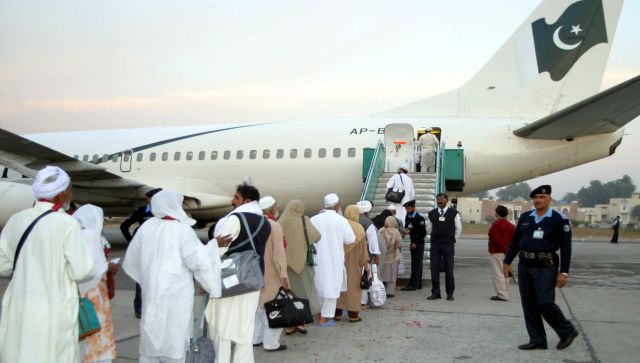
Muslim pilgrims circle the Kaaba inside the Grand Mosque in the holy city of Mecca, Saudi Arabia. For the first time in history, Pakistan is returning its Hajj quota to Saudi Arabia. File photo/Reuters

Muslim pilgrims circle the Kaaba inside the Grand Mosque in the holy city of Mecca, Saudi Arabia. For the first time in history, Pakistan is returning its Hajj quota to Saudi Arabia. File photo/Reuters
Pakistan is facing an unprecedented cash crunch. Its rupee is one of the worst-performing currencies globally in 2023. And inflation in the country rose a record 36.4 per cent in April, the highest in South Asia. The prices of food are skyrocketing, making essentials like wheat and fruits affordable. Amid all this, the Hajj has become unaffordable. For the first time in history, Pakistan, desperate to save money, has surrendered its Hajj quota to Saudi Arabia.
What is the Hajj quota?
The Hajj is an annual pilgrimage to Saudi Arabia’s Mecca, the holiest city for Muslims. It is mandatory for all adult Muslims, who are physically able and can afford the visit. The pilgrimage is undertaken in Dhu al-Hijjah, the last month of the Islamic calendar, and the rites are performed over five to six days.
However, as Muslims from across the world descend upon Mecca, it poses a huge logistical challenge for Saudi Arabia, from accommodation and food to safety. Hence, the kingdom allocates a quota to each country for the number of pilgrims they can send.
These quotas are largely based on the Muslim population in a country. And nations like Pakistan, where a majority of its people follow Islam, usually lobby Saudi Arabia for more slots.
What was Pakistan’s quota this year?
This year, Pakistan could send around 179,000 pilgrims for the first time since the COVID-19 pandemic hit Hajj operations. This national quota for Hajj 2023 was equally divided between public and private schemes.
The government needed a total of $284 million to facilitate the Hajj of which the finance ministry was to provide about $90 million, according to Gulf News.
Also read: Explained: ‘VIP Hajj quota’ that the Modi govt has scrapped
Why is Pakistan returning the Hajj quota?
Pakistan is in the midst of its worst economic crisis. Its forex reserves continue to dwindle and inflation is the highest since 1964 with no signs of easing.
Now the country has decided to surrender its Hajj quota to Saudi Arabia. The rising consumer prices have led thousands of pilgrims to skip the pilgrimage. Over 10 lakh people have lost their jobs, there has been a shortage of food and medicines. In this bleak scenario, where the common Pakistanis struggle to make ends meet, the Hajj seems like a distant dream.
Pakistan has returned 8,000 unutilised seats to Saudi Arabia. This will reportedly save the government $24 million.

According to sources in the religious affairs ministry, the move was aimed to save money as the government would have to pay the additional amount for every allocated seat which went unused. Hence, Pakistan decided to cut its losses.
The Pakistani government considered allocating the unused Hajj quota to private operators. However, it decided against it amid fears that the private players would buy dollars from the open market, reports the Express Tribune.
Every year, the country holds a lottery to distribute the Hajj seats. But this year, this was suspended as a shortage of applications was expected.
How much does the Hajj cost?
This year, the Hajj costs Rs 1.2 million ($4300) in Pakistani rupees for one pilgrim. Last year, the cost was around Rs 710,000 after a subsidy. The cost has increased by about 75 per cent this year.
The significant increase has been because of the devaluation of the Pakistan rupee.
Pakistan’s national airline Pakistan International Airline has announced fares for private Hajj, ranging between US$870 and $1,180 per pilgrim from the southern region. The airfares for pilgrims in the northern region will cost between $910 and $1,220, reports Gulf News.
The pilgrimage will commence on 26 June this year.

Is the Pakistan government giving a Hajj subsidy?
While the government is bankrupt, it is mulling the subsidy for Hajj pilgrims.
Last week, Pakistan’s federal minister for religious affairs Talha Mahmood warned the pilgrims that they could face “problems” during the pilgrimage as he spoke about the possible subsidy.
“I am hopeful of extending some subsidy to the intending Hajjis, however, we are facing a number of difficulties at the moment,” he said told a private TV channel, according to a report in Express Tribune.
“There is no subsidy this time but if we are able to lower our costs then we can give back that amount of money to the pilgrims,” he clarified.
Last year too, Hajj pilgrims faced financial difficulties as the government failed to provide subsidies.
With inputs from agencies
Read all the Latest News, Trending News, Cricket News, Bollywood News,
India News and Entertainment News here. Follow us on Facebook, Twitter and Instagram.